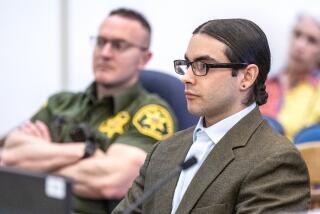A Long Way Home : Paralyzed Boy, 11, Leaves Hospital Ward After Six Years
- Share via
DOWNEY — At times, David Arechiga thought he would never be able to go home.
Arechiga was only 5 when he was struck by a car while crossing the street in front of his home. The accident left him paralyzed from the neck down, forcing him to spend the past six years in a hospital rehabilitation ward with other disabled children.
But on Tuesday, David, now 11, said an emotional goodby to his roommates and the staff at Rancho Los Amigos Medical Center in Downey and moved into a new room at his family’s Santa Ana home.
“I’m glad I’m home,” David said, as he inspected his new room, which is furnished with his hospital bed and ventilator and has a door that opens into the living room where the family gathers.
Although it is difficult for him to speak because of a ventilator tube in his throat, he clowned for the camera. And using a control that he presses with his chin, he took the family puppy for a spin around the driveway in his wheelchair.
*
Getting David home was not easy.
First, a Downey organization collected $33,000 in building materials for a required addition to the Arechigas’ green stucco house. Then, volunteers spent almost two years weaving through a maze of red tape to get necessary building permits.
But these troubles were eclipsed last week by jubilation when the hospital’s pediatric nurses threw a farewell party for the youngster.
David, the youngest of eight children, thanked everyone for helping him to get home.
“I’ve missed my sisters and my brothers and my parents,” David said.
“He was the sweetest, most appreciative kid the whole time he was here,” said nurse Paulette Nielsen, planting a kiss on David’s cheek. “He didn’t whine or complain once. I will miss him very much.”
Nielsen was on duty in March, 1987, when David was brought to the rehabilitation hospital. He had lost the use of his arms and legs. Hospital officials said he will use a wheelchair for the rest of his life.
David’s parents, Anita and Rafael Arechiga, wanted to take their son home long before now, but they were told they would have to learn to care for him first.
So the Arechigas learned how to prepare for emergencies, such as changing the breathing tubes connecting David to his ventilator.
The process took months, and when they were ready to bring him home, Medi-Cal officials informed them that their two-bedroom house was not large enough. For Medi-Cal to cover David’s medical expenses, he needed a room that met state guidelines: It must have enough space to accommodate a hospital bed, David’s ventilator and other medical equipment.
*
The family said they could not afford to build another room because Rafael Arechiga, a construction worker and the family’s sole breadwinner, had been hurt on the job and had not been able to work.
Meanwhile, members of the Downey Optimist Club, a group of businessmen who visit sick children in the hospital, noticed David.
Michael Bullock, a hospital social worker, recalled club members asking: “Why isn’t David going home?”
“When I told them, they said, ‘What if we built him an extra bedroom?’ ” Bullock said. “That was the start of it.”
Club president Sam Mathis, who operates a roofing company, organized the effort.
Many club members who work in the construction industry secured materials for the project. Others volunteered their labor.
Club members lobbied unsuccessfully for Santa Ana to waive its building permit fees. Instead, city officials insisted that the Arechigas needed a new garage, a new driveway, a new roof and some landscaping before they could build the addition.
The volunteers followed the city’s orders.
“We made a promise to him to get him home,” Mathis said.
Bullock, the social worker, said David will have to adjust to his new room but should be happier with his family.
It’s also less expensive for David to be cared for at home, Bullock said. David’s hospital care cost $30,000 a month, but his home care will cost $12,000 to $14,000 a month, Bullock said.
“It’s a lot of responsibility, it’s risky, but his quality of life will be much better,” Bullock said. “I believe there’s a connection between physical health and emotional well-being. At a period of time when we had no plan, he was clinically depressed. He had no end in sight to being here. Now he is bubbling.”
The Arechigas said they are just glad to finally have David home. They plan to throw a homecoming party for him once he has settled in his new room.
“Now, it’s a whole family,” said Lupe Arechiga, David’s older sister. “Before, someone was missing. It’s just nice to have the whole family together now.”
More to Read
Sign up for Essential California
The most important California stories and recommendations in your inbox every morning.
You may occasionally receive promotional content from the Los Angeles Times.










